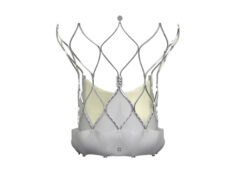
Coinciding with PCR London Valves (18-20 September, London, UK), Boston Scientific has announced it has received the CE mark for its Lotus Edge transcatheter aortic valve implantation (TAVI) system. A press release reports that compared with the previous generation valve (Lotus), the Lotus Edge iteration incorporates a more flexible, lower profile catheter designed to improve ease of use and accommodate tortuous anatomy.
The press release adds that another differentiating feature of the next-generation system is the inclusion of Depth Guard, a design element intended to reduce the need for a permanent pacemaker.
Leveraging the current Lotus platform, the Lotus Edge valve system integrates the Adaptive Seal technology which minimises paravalvular regurgitation, as demonstrated in the 1,000 patient RESPOND post-market registry. This study found that 91.9% of patients had core-lab adjudicated trace or no paravalvular leak pre-discharge, and 7.7% had mild paravalvular leak. No patients had severe paravalvular leak and only 0.3% of patients had moderate paravalvular leak.
Ian Meredith (director of MonashHeart, at Monash Medical Centre in Melbourne, Australia) says: “The Lotus Edge device is a highly anticipated next generation of the Lotus valve system. It retains many of its predecessor’s unique and valuable proprietary features, including the ability to reposition the device precisely and prevent paravalvular leak, while incorporating new design characteristics such as a more flexible catheter for easier delivery and Depth Guard technology designed to reduce valve interaction with the conduction system of the heart during valve deployment.”
According to the press release, Lotus Edge continues to be the only TAVI device that offers controlled mechanical expansion, which allows the valve to be fully deployed and assessed and then repositioned or fully retrieved by the physician, if needed.










